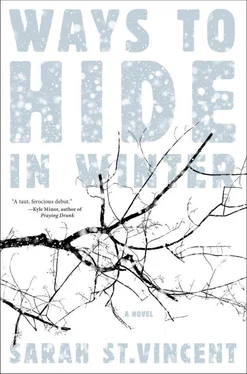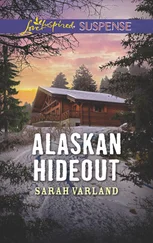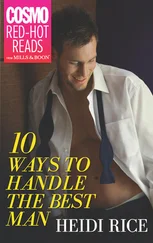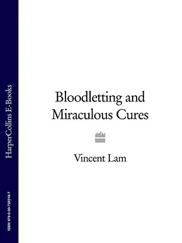After a moment, a strange expression came over his face, and he dropped the belt, walking away, shaking himself as if he too were disturbed by what he had done.
When I put the food on the table, we sat down and ate. Neither of us mentioned what had happened.
The next morning, something in me snapped. I didn’t mean for it to happen, but it did. Amos was out, and I was cleaning the house, turning on the radios as I moved from room to room so I wouldn’t be alone in the silence, not caring what was playing. Suddenly, the house was filled with a cacophony of voices from different stations, and I stood in the middle of it, a rag dangling from my fingers. Without quite knowing what I was doing, I moved down the stairs, putting one foot in front of the other. Then I was stepping into the sunlight and closing the front door behind me. I dropped the rag in the grass next to the house and began to walk, my hands still smelling of cleaning solution and my hair tied back in a bandanna. I didn’t bring money. I didn’t bring a change of clothes. I didn’t bring anything.
I just went.
My feet took me to the county road, then the state one. I passed the fields, the old oak trees, the spring that ran under the small bridge by the railroad tracks. The fire company slid by on my left, then Miller’s on my right, and then the mountain stood in front of me, imposing and green. I walked along the shoulder of the road, my eyes fixed ahead, my shoes leaving prints in the dust. My T-shirt began to cling to me, sticky with sweat, but I kept going, up the long ascent that flew by when you were driving. The sun was burning my forearms, my thighs—I was pale after so many months indoors—but I pushed on, into the shade of the trees. The cars and pickups would slow as they passed me, and finally one picked me up, carrying me to Gettysburg. I rolled down the window and let the breeze cool my face while the driver—an old man in suspenders, compact, with a face covered with white stubble—smoked a cigar. He didn’t say anything, and neither did I.
When we got to Gettysburg, I stepped out, looking up at the other side of the mountain. The smoothly paved road, whose tar bubbled and fumed, took me through the canning towns, past the factories and the small knots of houses where, by and large, nobody lived. My knees ached, and I was thirsty, but the sun mysteriously seemed to have taken away my hunger, to have drawn it up out of me. I kept going, my canvas shoes beginning to fall apart, the left sole flapping when I took a step. For a little while, I stopped to rest outside an old schoolhouse, watching the clouds to the west begin to grow orange and red. When a car slowed in front of me, however, I waved it away and stood up, moving on.
It was long after dark by the time I reached Orrtanna. The light over the sign for the church was the only one for what seemed like miles; it shone by the side of the road, Father MacIntyre’s name and the mass times seeming to hover in the blackness. Around me, the crickets and frogs sang, a soft but impenetrable backdrop of noise. There was no sign of life in the ranch houses and trailers that dotted the road, nor in the rectory, whose steps I soon mounted. I knocked on the door, holding my breath. The night air was chilly, and I wrapped my arms around myself, allowing my mind to form a complete, coherent thought for the first time that day: I wished I’d brought a jacket. And I would have sold everything I owned for a glass of water.
I raised a hand to my throat, where the belt had been. There weren’t any marks there. Not that I had seen.
The priest opened the door in his undershirt, his hair—already white by then—drooping over his forehead and his eyes frightened and watery behind his glasses. He was stooped forward, his chin thrust out, but when he saw me he straightened in surprise and befuddlement. “Oh,” he said. “It’s Mrs.—Mrs.—”
“Kathleen,” I said. I hadn’t expected him to recognize me at all; I hadn’t been to mass since I’d gotten married. I rubbed my bare arms, shivering slightly.
“Come in,” he said, switching on a light in the hallway. “Come in, come in.” Turning around, he beckoned to me over his shoulder, and I followed him. The corridor was narrow, the wallpaper a fading red and gold, and as he led the way with unsteady steps, I felt as if I were being drawn into a cave. It was only a sitting room, however: the same as any sitting room in the valley, with a pair of old reclining chairs, a flowered loveseat, shag carpet. A boxy TV sat on a table, its antennae casting shadows on the wall. The priest turned on a lamp. “Sit down, sit down. What brings you here? Actually, if you’ll forgive me, I need to excuse myself for just a moment, but do have a seat.”
I perched on the edge of one of the reclining chairs, embarrassingly aware that he had excused himself to use the toilet. While he was gone, I looked around the room, fidgeting. For some reason, I expected that when he returned, he would be wearing the robes in which I’d always seen him, but when he sat down across from me he was still in the stretched white undershirt. He leaned toward me, clasping his arthritic hands together.
Amos would have been looking for me for hours by now, I realized dimly. He would be frantic.
“What can I do for you, Kathleen? What’s the matter?” The priest pushed his glasses up his nose, fixing me with a look that was sympathetic but wary. Before I could go on, he looked down. “Goodness gracious, you’ve hurt your feet.”
I glanced down, too, and saw that blood was soaking through the toe of one of my shoes. “I’m sorry,” I said quickly, pushing myself out of the chair. “I—”
“No, just stay there, it’s all right. Let me get you some bandages. Do you think you need a doctor?”
“No, I’m sure they’re just blisters.” I looked around, more embarrassed than ever. The only thing in the room that would reveal this to be a priest’s house was a painting of the Virgin that hung in a corner. There were some dusty spider plants, an ashtray with a coating of gray on it. The priest hurried off again, and I heard the clicking of a light switch, followed by a rustling and clinking in what I assumed was the kitchen.
I leaned back in the chair, gazing up at the painting. It was ordinary, just the Virgin by herself, blue-robed, modest, grieving for the world. I looked away and closed my eyes. The smell of stale cigarette smoke that clung to the chair was vaguely comforting, and I rested my head against the upholstery, breathing deeply, listening to the indistinct murmuring that came from the kitchen.
When I opened my eyes again, there was a glass of water on the table beside me, along with a dusty box of Band-Aids. The priest was seated across from me, reading a book. He had put on a sweater.
“Thank you,” I said, reaching gratefully for the water and draining the glass. “How long was I asleep?”
“Not long. Just a short nap. You’ve obviously had a bit of a walk.” He rose to fetch another glass of water and settled in again. “Now, tell me how I can be of help.”
The day came back to me.
“My husband,” I said.
“Yes?”
“I just—” I didn’t know what to say, and I found myself stumbling into the truth before stumbling back out again. “I ran away. Not really. I just needed to get out for a day.”
“I see.” He adjusted his glasses, crossing his legs and wrapping his hands around his knee. “And what brought you here?”
“I don’t know.” Then I said the thing I had never admitted to myself before. “I—I’m afraid. Sometimes.”
Picturing Amos behind the wheel of his truck, furious, worried, searching for me, I felt a quickening of guilt—of panic—but pushed it aside.
“What are you afraid of?” He squinted at me with a look of concern. “Does he hit you?”
Читать дальше












